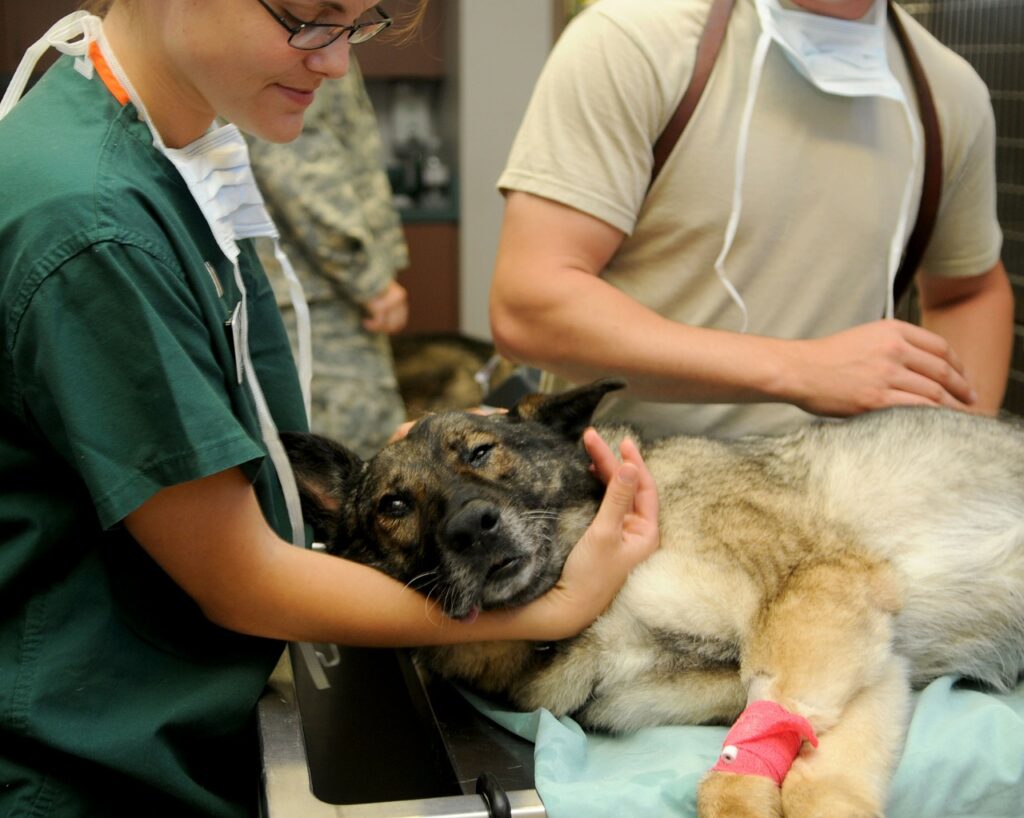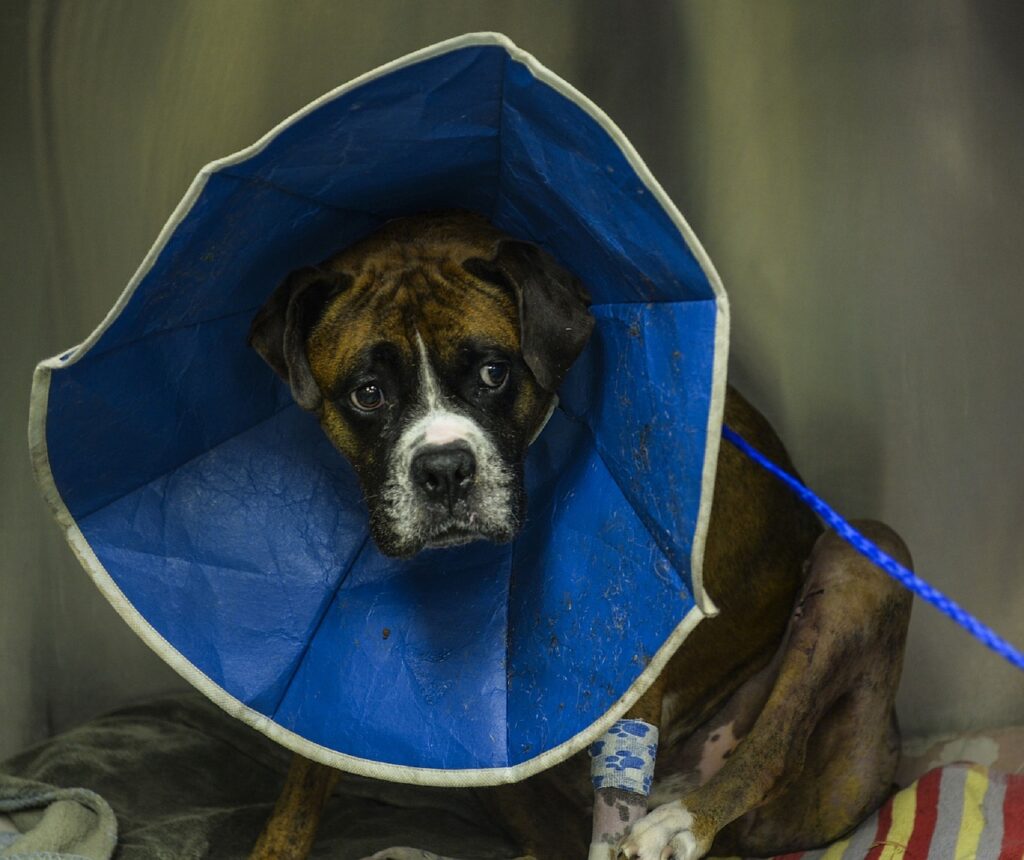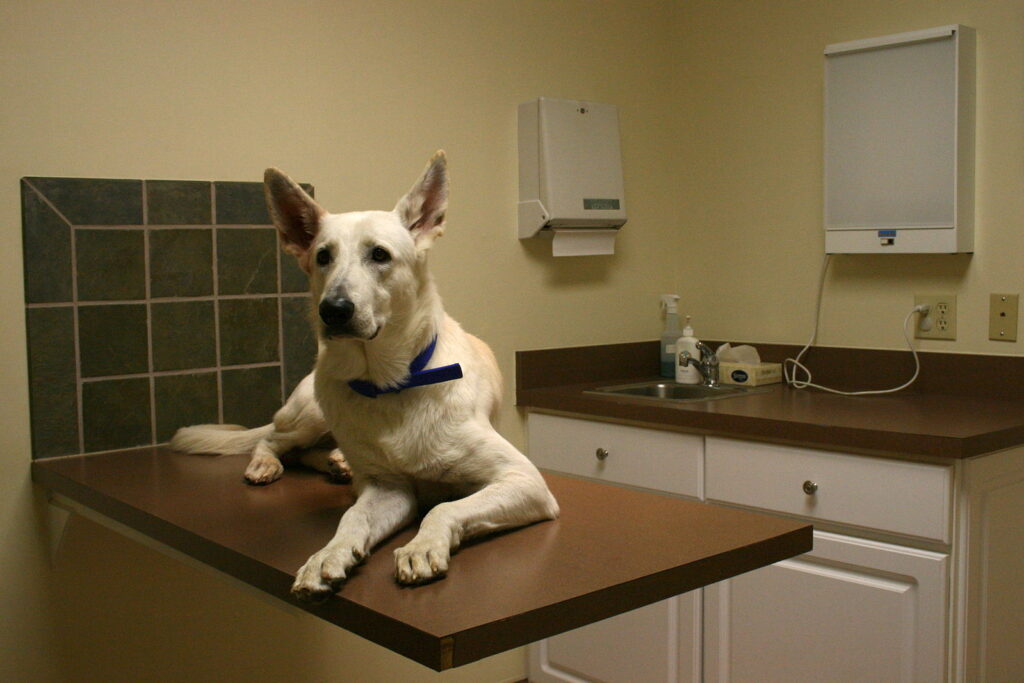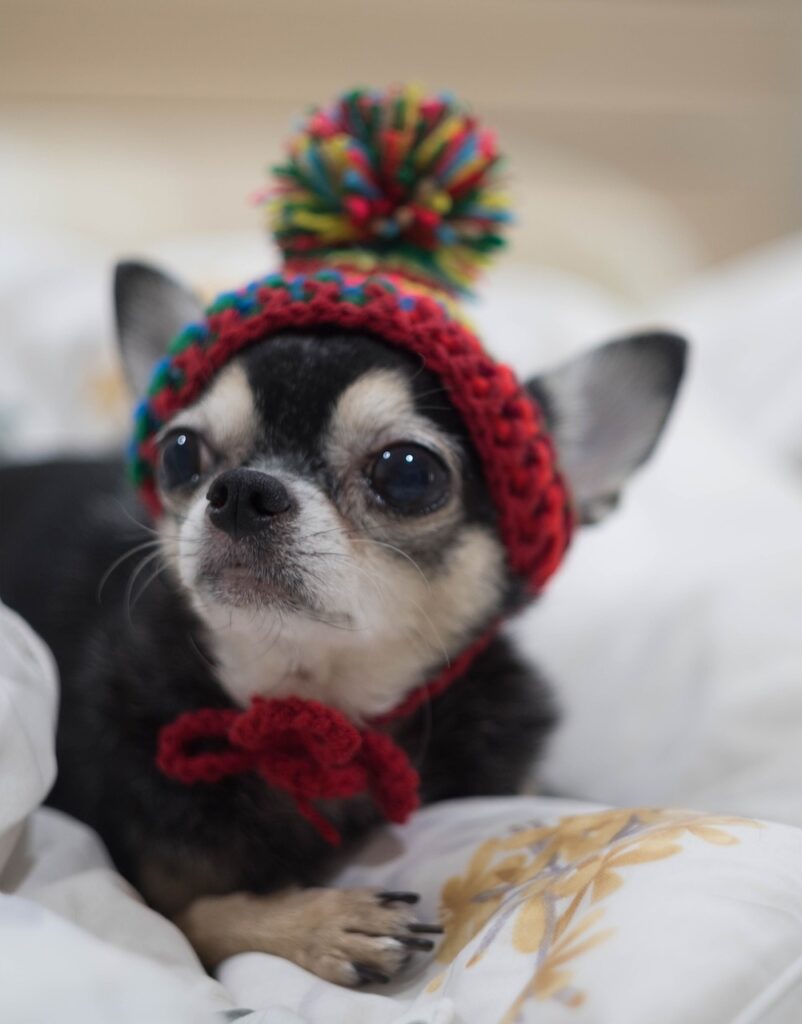Getting an animal spayed or neutered is a common procedure performed by vets all over the country. After a surgical operation, your dog will need care whilst they heal – This guide will help you when caring for a dog after neutering.
Terminology
Castration – the removal of testicles
Spaying – removing the uterus
Bitch – a female dog
What does neutering involve?
For male canines, neutering involves removing the testicles to prevent him from fathering puppies, it is usually a very routine procedure. The procedure is a little more in-depth for females as the surgeon will have to open the abdomen to remove the ovaries and uterus.
Why should I get my dog neutered?
Neutering will prevent a dog from breeding. A lot is involved with bringing up a litter of puppies – it is very messy, expensive and disruptive to your home. You will also need to make sure the puppies go to good homes and both parents are in good health to avoid passing any genetic conditions down.
Neutering a male has many benefits;
- Many entire canines scent mark by cocking their leg and urinating on objects which can include inside the house.
- Male dogs will have a change in their behaviour if they are around a bitch in season and will do all they can to get to her – including trying to escape your home and running away.
- It removes all risk of testicular cancer.
- It reduces the risk of prostate problems.
- Many male dogs will hump other dogs, furniture and even your leg!
- Some entire dogs will become aggressive towards other male dogs.
Spaying a female will benefit them by;
- Prevents them from coming into season which usually happens twice a year. During this time, she will bleed and attract the attention of male dogs.
- Removes the risk of ovarian cancer, pyometra (an infection of the womb which requires emergency surgery and some dogs will die of the infection) and reduces their chances of getting mammary tumours.
- Reduces the risk of phantom pregnancies which can change your dog’s behaviour.
- Pregnancy and labour can be dangerous and complications such as an emergency caesarian will be costly.
Top Tip – engrave on their tag “I am neutered” to deter dog thieves.
Will it change my dog’s temperament?
It is commonly believed that neutering a dog will calm them down, however, this isn’t the case. Your dog will still have the same personality they did prior to surgery but may stop some of the unwanted behaviours such as humping and marking.
Should I let my dog have one litter before spaying?
There is no evidence to suggest this is beneficial to your dog and pregnancy in itself can be risky due to complications during labour. Unlike us, dog’s do not form long term relationships with their young so do not get the same emotional bonds we get if we were to have a baby. The longer you wait to neuter, the higher the chances of behavioural or medical problems developing.
What should I do before the surgery?
Caring for a dog after neutering begins before their operation – Don’t give your dog any new foods before the surgery in case they don’t agree with them and give them diarrhoea. If a dog is booked in to be neutered and has vomiting or diarrhoea, the surgery will have to be postponed.
All dogs will be thoroughly cleaned around the operation site before the operation, but it’s best not to take a muddy dog in! Ideally, give your dog a bath beforehand as they won’t be able to have one for a while after the surgery.
As your dog will be under full anaesthetic, most vets ask you to starve your dog from 10 pm the night before and take water up in the morning, however, you should ask your vet what their practice recommends.

How long will my dog be at the vet’s for?
Whilst all individual practices will vary, generally, your dog will have an appointment before the surgery with the vet to discuss any questions you may have and for the vet to check your dog’s health. If your pet is overweight, the vet may suggest them losing weight first because overweight animals are more at risk during surgery.
You will then be asked to book your dog in for surgery. Again, all practices will differ but most ask for you to bring your dog in first thing in the morning and you will be asked to fill in some paperwork regarding your dog and the operation and sign your consent. Most dogs are able to return home the same day as long as everything has gone well and the vet will ask to see them back in a few days to check the surgical site.
Your dog will be checked over by a vet and should they be anxious, they can be medicated to calm them down. A catheter will be placed in their front leg to allow drugs to be administered into the bloodstream and a small patch of fur will be shaved on their leg as well as the operation site.
Top tip – avoid booking your dog in for their operation at the end of the week or around a Bank Holiday as your normal vets will most likely be closed and should there be a problem, you will have to go to an out of hours vet.
Caring for a dog after neutering
All dogs react differently after the surgery. Some are full of energy whilst others are more subdued. It’s really important to keep your dog in a calm and quiet room and avoid them from jumping up or on and off objects – you may need to lift them in and out of the car when you collect them from the vets. They need to rest after surgery and some owners like to take a few days off work or ask someone to look after them so they aren’t on their own.
The evening they come home, they will need bland food such as chicken and rice or a recovery diet. It’s better to give this in small meals every few hours, rather than a full bowl.
It is important that your dog doesn’t lick the surgical site as they could introduce bacteria from their mouth and cause an infection – the other risk is they could even undo their stitches. To prevent this, your dog will need to wear either a plastic cone, soft cone, inflatable collar or recovery suit. Most dogs will dislike wearing any of these, however, it is so important to avoid more problems and expense later on.

Your dog needs as much rest as possible, and your vet will advise what exercise your dog can have, but for the first few days, they are usually only allowed in the garden to go to the toilet.
Some dogs get frustrated whilst healing after an operation as they can’t go on walks or play. You can still tire them out with mental games, check out this blog to read ideas to keep their brains busy!
Most dogs will be sent home with medications and a nurse will tell you what your dog needs and when. You may want to set a reminder on your phone to help you remember. You should check the operation site a few times a day and it’s a good idea to look at the operation site when you collect them from the vets so you have something to compare it to – you may even want to take a photo to help you compare. Should you notice any swelling, discharge or warmth around the area, contact your vet right away.
Caring for a dog after neutering can be an anxious time, but your vet is there to offer you any support you may need.
This blog does not replace a veterinarian! If you are worried about your dog, always ring your vet for advice.
Read this blog on what you should keep in your dog’s first aid box.


